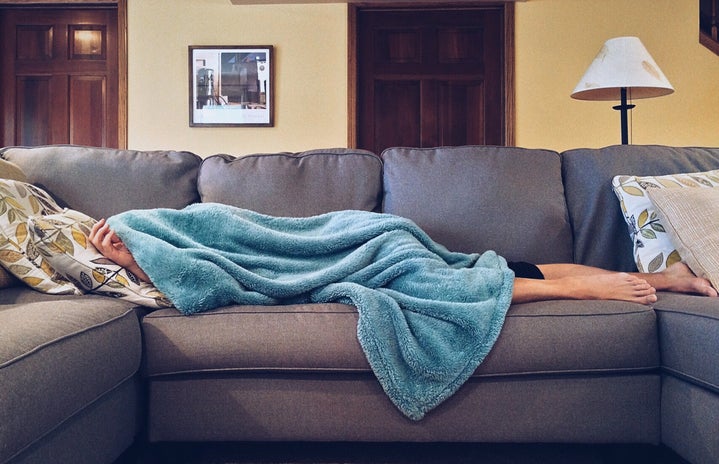Having a regular sleeping schedule is already hard enough during quarantine with the long winter days, let alone during term time when the stress of deadlines is weighing on our minds. Like many others, these anxieties often seep into my sleeping and disrupt the rest my body needs to focus on my studies—it’s a vicious cycle. Despite knowing how important a good night’s sleep is, I often find myself staying up late to finish assignments or waking up at infrequent times. Yet, with the new year and new term ahead, I’m aiming to adjust my daily habits to improve my sleep quantity and quality. Here are some tips!
- Be consistent
-
Whenever I don’t get my recommended 7 or 8 hours of sleep, I’m grumpy and tired for the rest of the day. Sleep deprivation alters our body’s internal sleep-wake cycle, our circadian rhythm, and has long-term impacts on our immune system and physical wellbeing. Train yourself to go to bed and wake up at the same time every day. This may be difficult at first, particularly as keeping track of time is difficult when you spend it all day indoors, but your body will eventually adapt and your routine will feel natural.
- Avoid any stimulants
-
Nicotine, alcohol, or caffeine can make it very difficult to sleep. They interrupt normal brain functioning, worsen the quality of our sleep, and can even affect hormone production which ultimately impacts our circadian rhythm. Do your best to replace caffeinated drinks with herbal teas (I like chamomile!) or warm milk in the evening, and avoid any alcohol or smoking at night.
- Watch what you eat
-
Although some studies suggest that eating a high-carb meal at least 4 hours before bed can improve sleeping, the general advice is to avoid heavy meals or snacking prior to your bedtime. This is particularly important if you eat anything with a high-sugar content as the energy boost is likely to keep you up.
- Leave your phone alone
-
I struggle with this the most. Most nights I crawl into bed and scroll through social media until I’m too tired to hold my phone up anymore. However, the blue-light from our smartphones can make it difficult to fall asleep as it suppresses melatonin production, the sleep hormone that ensures we get a good night in. Try to put your phone away at least an hour or two before going to bed but if that doesn’t seem realistic, you can always avoid the screen by listening to an audiobook instead.
- Plan the next day
-
Sometimes it’s difficult to go to sleep when you have worries on your mind, even after you’ve done all the right things. I always find it useful to write down a small to-do list for the next day to make me feel prepared the moment I wake up, which can help manage my anxieties.
- Make your environment comforting
-
Switch off any lights (unless you enjoy a soft ambient night light), keep your bedroom slightly cool temperature-wise, ensure your bedding is comfortable, and try to minimise noises by closing windows and doors. Ensure your environment is optimal for relaxation and promotes sleeping.
- Leave your bed
-
Slightly unorthodox to get out of bed in order to sleep but if you’re finding it difficult to switch your brain off, get up and do an activity like reading or yoga stretches until you feel sleepy again. Light exercise helps distract the mind and allows the body to return to a relaxed enough state to sleep again.
- Try essential oils
-
Aromatherapy can help the body to unwind in the evenings and drift off to sleep sooner. Essential oils like lavender, eucalyptus, jasmine, vanilla, rose, chamomile, and sandalwood all improve sleep quality and destress the body. There are plenty of options for using these oils in order to reap their benefits: add a few drops to some water and spray around your room, rub them on areas of your body that are naturally warm like wrists, neck, back of knees, and inner elbows, opt for scented candles, or invest in a diffuser for your room.
Now, I may or may not have written this article during one of my late night cramming sessions and yawned the entire time. It’s probably hypocritical for me to be giving advice on sleeping when I know that I won’t be getting much tonight. But changing your sleeping habits is a lifestyle adjustment and requires plenty of patience. Maintaining a regular sleeping schedule is essential for our physical health and emotional wellness. While all-nighters may still be inevitable, it’s important to get as much sleep in as we can this term—we’re going to need it.



